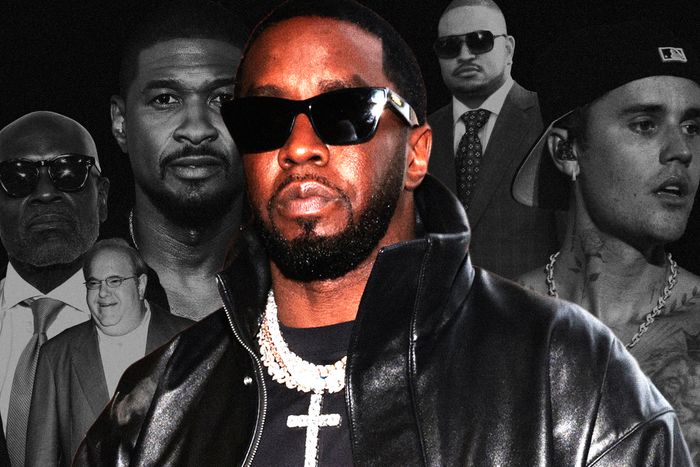In a recent interview, rapper and entertainment mogul Ice Cube shared his thoughts on Jay-Z’s past associations with two of the music industry’s most controversial figures—R. Kelly and Sean “Diddy” Combs. Ice Cube’s comments have stirred up a conversation about fame, influence, and the complex dynamics within the hip-hop and R&B scenes, raising questions about the relationships among these industry titans and the darker side of celebrity alliances.
Jay-Z’s past collaborations with R. Kelly are well-documented. In the early 2000s, the two superstars teamed up to produce The Best of Both Worlds, a joint album that combined their fan bases and musical talents. At the time, the collaboration was seen as a masterstroke—a blending of rap and R&B royalty. However, as allegations and evidence of R. Kelly’s abusive and illegal behavior toward young women and minors came to light, their association became a topic of controversy.
Similarly, Jay-Z’s association with Diddy, a close friend and industry peer, is both deep-rooted and complex. Diddy, a pioneer in hip-hop, has also faced criticism and numerous allegations over the years, though nothing as severe as those against R. Kelly. Nonetheless, Diddy’s reputation has been marred by accusations ranging from shady business practices to troubling personal behavior. Jay-Z and Diddy have been photographed together, attended events side-by-side, and occasionally collaborated, forming a highly influential partnership that helped define an era of hip-hop.
During his interview, Ice Cube offered an insider’s perspective on the complicated dynamics in the music industry, suggesting that powerful figures like Jay-Z sometimes make questionable alliances to achieve success. He explained that, especially in the early 2000s, there was a great deal of pressure within the industry to collaborate with the biggest names, regardless of any personal misgivings about their behavior or reputation.
Ice Cube suggested that Jay-Z’s connections with both R. Kelly and Diddy may have been born not from personal affinity, but from strategic decisions in an industry where powerful partnerships can make or break careers. “There’s always a price to pay in this industry,” Cube reportedly said, “and sometimes, you pay it by standing next to people you wouldn’t normally be around.”
This insight sheds light on how the pressures of fame and the desire for longevity in the industry can lead artists to compromise their values. While it doesn’t excuse such associations, Cube’s comments suggest that sometimes, powerful alliances are based more on business than on genuine friendship.
The collaboration between Jay-Z and R. Kelly on The Best of Both Worlds initially seemed like a smart career move, but the partnership soon unraveled. During their Best of Both Worlds tour, tensions arose between the two, leading to a public fallout. The tour ended abruptly after a notorious incident in Madison Square Garden, where Kelly claimed his safety was threatened, and Jay-Z continued without him.
Ice Cube touched on this rocky relationship, hinting that Jay-Z might have realized too late that Kelly’s behavior could damage his own reputation. In Cube’s view, Jay-Z’s willingness to collaborate with Kelly may have been an effort to expand his reach into the R&B world, but it ultimately backfired due to Kelly’s now-documented abuse and exploitation.
Jay-Z’s relationship with Diddy is a different story. While Diddy does not have the same criminal history as R. Kelly, he has faced his own controversies, especially regarding his business practices. Ice Cube suggested that Diddy’s close friendship with Jay-Z may have been largely rooted in mutual benefit, as both men were aware of the influence they held in the music world. They shaped hip-hop’s trajectory together, blending commercial appeal with artistic flair, and demonstrating how powerful alliances could lead to wealth and cultural influence.
However, Ice Cube hinted that, over time, Jay-Z may have recognized the darker aspects of Diddy’s influence. “It’s not easy to walk away from someone who’s been close to you at your highest and lowest moments,” Cube explained, suggesting that sometimes these ties endure out of loyalty or shared history, even when one party may have concerns about the other’s actions.
Ice Cube’s reflections reveal a culture within the industry that sometimes prioritizes business connections over moral considerations. This culture can lead artists to overlook or ignore the disturbing actions of their peers. Jay-Z’s connections to both R. Kelly and Diddy underscore the complex relationships within an industry where fame, wealth, and influence often eclipse personal misgivings or red flags about someone’s behavior.
Ice Cube’s comments serve as a reminder of the compromises that artists may make to stay at the top. His words highlight the pressure many face to maintain relationships with powerful figures, even if they may have concerns about those individuals’ actions. This insight paints a sobering picture of the hidden costs of fame, illustrating how celebrities can become trapped in networks of influence, loyalty, and moral ambiguity.
In recent years, there has been a shift toward holding public figures accountable, even when those figures wield considerable power. With more transparency and a greater focus on ethics, artists today may have more freedom to distance themselves from individuals with troubling histories. Ice Cube’s commentary emphasizes the importance of carefully considering who to associate with, not only for one’s career but for one’s legacy.
For Jay-Z, his associations with R. Kelly and Diddy might serve as reminders of a time when such alliances were almost essential for success, regardless of potential reputational risks. Today, in a different cultural climate, artists have the opportunity to make choices that align with their values and to build careers without feeling pressured to compromise.
In Ice Cube’s words, “At the end of the day, it’s about finding a way to stay true to yourself without losing what you’ve worked so hard to build.” His insights serve as a lesson to emerging artists and a reminder that, sometimes, staying true to oneself means walking away from relationships that don’t align with one’s values.










